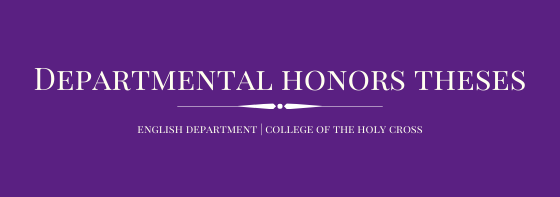
Date of Creation
5-11-2020
Document Type
Departmental Honors Thesis
Department
English
First Advisor
Melissa Schoenberger
Abstract
The thesis culminates in the twentieth century and yet it begins with the Ulster Cycle, a period of Irish mythological history that occurred around the first century common era. Indeed, since the time frame was before the arrival of the Gaels, Normans, or Christianity, the extent of this mythology’s relevance today is whatever extent it is conceptualized as “Irish.” As such, the first chapter locks onto an aspect that could feasibly transcend time and resonate with modern Irish society: gender. Of course, the epistemological dynamics of gender[1] in the first-century common era are vastly different than the twentieth century dynamics, but there is still more prevalent resonance in terms of gender than, say, martial exercises, cattle raids, or the intervention of minor “gods.” Most importantly, the poetic conceptualization of gender in Irish mythology is a major factor in the continued imagination of the Irish national character. Specifically, Medb is a figure of femininity (and Ireland herself) whereas Cúchulainn embodies Irish masculinity and the compulsion to fight, even against immense odds.
Medb and Cúchulainn’s prevalence and the general exhortations of Irish mythologies continue well into the 20th century, as evident in Yeats’s poetry. As such, the second chapter focuses on the transition into the Irish twentieth century and is oriented primarily on Yeats. Eavan Boland is also heavily featured in this chapter, for her later work poses an essential deconstructive framework to compare against Yeats’s; conversely, Pádraig Pearse and Dwyer Joyce are also regarded due to their mystical resonance with Yeats. Yeats’s earlier poems were often more indulgent in Irish mythology and the speaker often explicitly refers to writing poetry through verse. Yeats’s later poetry is much more cautious about projecting Ireland’s future from a past fraught with mythology, especially as he cannot meaningfully register this abstracted mythology with the brutal material reality of Irish revolution and colonialism. This ambiguous uncertainly is most clearly and poignantly express in his poem “Easter, 1916.” The Easter Uprising of 1916 poses a violent interruption to the reliance on mythologized historiography, especially in the context of some Irish republicans’ belief in a mystical “blood sacrifice” for Ireland through their deaths (but not their triumphs). Ultimately, 1916 is the key factor to a contingent sequence of events: the Irish War of Independence, the Irish Civil War, and, decades later, The Troubles.
As such, the third and final chapter focuses on The Troubles, and the concurrent poetry of Seamus Heaney and Eavan Boland.[2] Given the overbearing weight of violence and uncertainty during this time in Ireland, these poets augment Yeats’s feeling of uncertainty expressed in “Easter, 1916”. Providing a crucial deconstruction of many of the poetic and historical pretenses that conditioned and exacerbated sectarian beliefs, Boland and Heaney thoroughly navigate the value of Irish mythology and history. By grounding history and poetic narrative in the material and personal, they carefully reject using poetry or history as political frameworks for justifying continued violence. On the contrary, their deconstruction of Irish culture and history affords modes of understanding the personal and affective experience of colonial violence; this, in turn, spurns the kind of poetics and histories that are detached enough from material violence to perpetuate such violence, whether unknowingly or not.
[1] That is, how gender is conceptualized and how gender dynamics play out.
[2] Unfortunately, the day that I wrote this introduction (4/27/20) was the day in which Eavan Boland passed away in Dublin. I would just like to note my condolences to her family and loved ones, but I am certain that her supreme poetic aptitude will carry her memory indefinitely.
Recommended Citation
Fay, Ryan, "The Poetry of History: Irish National Imagination Through Mythology and Materiality" (2020). English Honors Theses. 1.
https://crossworks.holycross.edu/engl_honor/1
Included in
Celtic Studies Commons, European History Commons, Folklore Commons, Literature in English, British Isles Commons


Comments
Included in Virtual Academic Conference 2020.